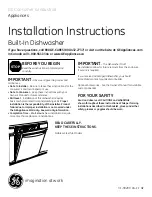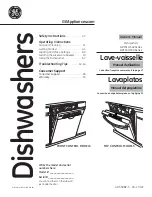
representative if you are in doubt whether the appliance is properly
grounded.
Do not modify the plug provided with the appliance; If it does not fit the
outlet.
Have a proper outlet installed by a qualified electrician.
Do not abuse, sit on, or stand on the door or dish rack of the dishwasher.
Do not operate your dishwasher unless all enclosure panels are properly in
place.
Open the door very carefully if the dishwasher is operating, there is a risk of
water squirting out. Do not place any heavy objects on or stand on the door
when it is open. The appliance could tip forward.
When loading items to be washed:
Locate sharp items so that they are not likely to damage the door seal;
Warning: Knives and other utensils with sharp points must be loaded in the
basket with their points facing down or placed in a horizontal position.
Some dishwasher detergents are strongly alkaline. They can be extremely
dangerous if swallowed.
Avoid contact with the skin and eyes and keep children away from the
dishwasher when the door is open.
Check that the detergent powder is empty after completion of the wash
cycle.
Do not wash plastic items unless they are marked “dishwasher safe” or the
equivalent.
For unmarked plastic items not so marked, check the manufacturer's
recommendations.
Use only detergent and rinse agents recommended for use in an automatic
dishwasher.
Never use soap, laundry detergent, or hand washing detergent in your
dishwasher.
The door should not be left open, since this could increase the risk of tripping.
If the supply cord is damaged, it must be replaced by the manufacturer or its
service agent or a similarly qualified person in order to avoid a hazard.
During installation, the power supply must not be excessively or dangerously
bent or flattened.
Do not tamper with controls.
The appliance needs to be connected to the main water valve using new hose
sets. Old sets should not be reused.
















































